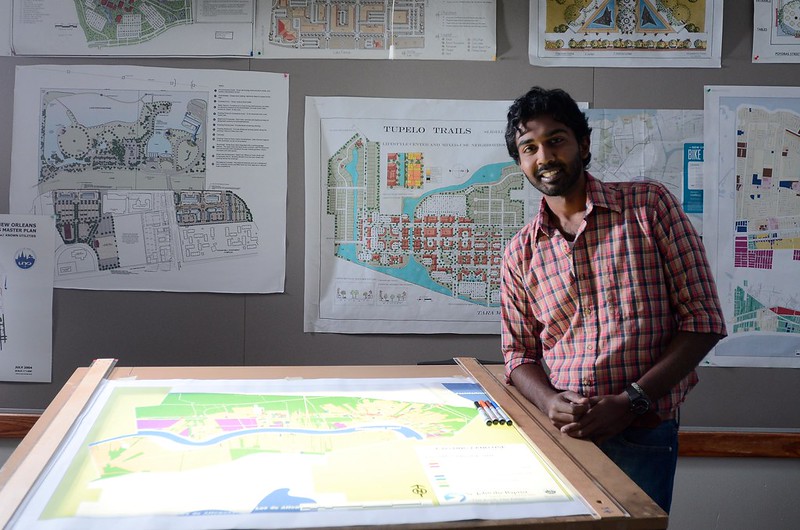Areas of Specialization
Geography
By completing a concentration in geography, you’ll gain a deep and nuanced understanding of how people interact with their environments, and how we create the places we live in. You’ll study the foundations of geographic information systems (GIS) and mapping, and you’ll explore the political, regional, and cultural forces that shape cities, countries, and lives. The geography concentration requires 12 GEOG credits, which count toward the required courses for the major.
Planning
With a concentration in planning, you’ll explore what it takes to direct the development of cities and towns—whether that’s preparing for growth, addressing the effects of population loss, or adapting to changing environmental factors. You’ll study the strategic use of public space and effective infrastructure, so that you can create an effective plan to transform a community for the better. The planning concentration requires 12 MURP credit hours, which count toward the required courses for the major.
Transportation
Cities should be built for people, not cars—and by concentrating in transportation, you’ll prepare to make that truism a reality. You’ll learn how to promote sustainability and effective living through transportation design, whether that’s more accessible public transit or adjustments to traffic patterns. Ultimately, you’ll be prepared to help cities operate more efficiently and sustainably, protecting our planet and improving the flow of life for all people. The transportation concentration requires 12 specific credits in the URBN and MURP programs, which count toward the required courses for the major.
Current Students
- Degree Checklist
- Four Year Plan of Study
- Honors
- Scholarship Information
- Planning Careers
- Planning Skills
- Student Spotlight-Eian Bailey
BS Coordinator:
David Lambour
dmlambou@uno.edu
Major and Minor Opportunities
Bachelor of Science in Urban Studies and Planning
The interdisciplinary, intensive urban studies and planning degree is designed to equip you with a strong working knowledge in the fundamentals of cities, urban development, urban planning, urban policy, and related fields. Students who complete this degree are prepared to enter the urban planning profession in either the public or the private sector, or to continue their education with a master’s degree in urban planning.
The bachelor of science in urban studies and planning is a 120-credit-hour program, including 39 general education credits, 45 other required credits, and 36 credits specific to urban studies and planning. More information, including specific required courses, can be found here.
Honors in Urban Studies and Planning
Students looking to gain more in-depth knowledge while completing their urban studies and planning degree can pursue an honors degree in urban studies and planning through the UNO Honors Program. To qualify for the honors program, you’ll need a cumulative GPA of 3.25 or better, as well as a 3.5 GPA or better in urban studies and planning courses.
The capstone of the honors degree is the senior honors thesis (URBN 3999), an independent research project on a subject of your choice. After completing the two-semester thesis course and successfully defending your honors thesis in front of a committee, you will be eligible to graduate with honors. If you have further questions, the UNO Honors Program may be able to help.
“In the Urban Studies and Planning program, the professors care so much about their students. They want us to understand and develop the skills that will help us the most in our careers.”
— Kielee Clement
B.S. in Urban Studies and Planning
What You’ll Learn
Cities are complex organisms: intricate, interconnected, and always changing. To understand them—and beyond that, to improve them—you’ll need to approach each urban project from a multitude of different angles. The multidisciplinary B.S. in urban studies and planning will give you the tools you need to assess the needs and challenges of an urban environment, plus the professional skills you need to put a solution into action.
With a B.S. in urban studies and planning, you’ll…
- Understand the environmental, economic, and social processes that have shaped urbanization in and beyond the United States
- Use both primary and secondary sources to explain urban and regional phenomena
- Develop professional oral and written communication skills required to work in municipal and state public sector agencies, private sector development and planning firms, and nonprofit organizations
By the time you complete the urban studies and planning degree, you’ll be ready to help public, private, and nonprofit-sector organizations transform cities—and the health and happiness of the people who live there—for the better.
Student Learning Outcomes
Student Learning Outcomes specify what students will know, be able to do, or be able to demonstrate when they have completed a program of study.
Sample Courses
- Cities of the Global South
- Coastal Zone Planning and Administration
- Environmental Impact Assessment
- Environmental Justice in Urban Environments
- Gentrification in Historic Districts
- Globalization and Mobility
- Legal and Ethical Issues in the Nonprofit Sector
- The Post-WWII City
- World Regional Geography
What Can You Do with a B.S. in Urban Studies and Planning?
- Data Analyst
- Communications Associate
- Nonprofit Program Coordinator
- Operations Manager
- Realtor
- Transportation Planner
- Urban Planner
- And More!
“The professors in the Urban Studies and Planning department completely demystify the field and help you become part of it. There’s more access to internships here than I’ve seen in any other department.”
— Josiah Wolf,
B.S. in Urban Studies and Planning
Student Organizations
Crescent City Shapers
Crescent City Shapers is a student organization affiliated with the Planning and Urban Studies Department at UNO that is open to all UNO students. A meeting ground for networking and socializing, the group aims to encourage knowledge of urban studies and urban planning, as well as serving as a community of interest and activity for its members.
The Crescent City Shapers host a number of events throughout the year, including social events, networking panels, movie screenings, service projects, and more. It’s an excellent way to meet other students interested in urban planning, and to build the professional connections that could last a lifetime.
For more information about the Crescent City Shapers, including how to get involved, email crescentcityshapersnola@gmail.com.
UNO Transportation Institute
To realize the full potential of passenger and freight transportation systems, we’ll need to research deeply and think boldly. The researchers at the UNO Transportation Institute are well aware of this—and the Institute gives them the perfect home base to do that work.
Home to some of the nation’s leading transportation researchers, the UNO Transportation Institute offers research, professional outreach, and education programs to UNO students and the greater UNO community. Our core expertise includes policy for sustainable, resilient, and safe transportation systems. Specific areas of study include maritime and port planning, transit planning, walking, bicycling, and transit-oriented development. The Institute has also played an instrumental role in the recovery of New Orleans after Hurricane Katrina.
You can learn more about the work taking place at the UNO Transportation Institute, including how to contribute to its research, here.
Center for Hazards Assessment, Response, and Technology (CHART)
UNO-CHART is an applied social science hazards research center with one major goal: to improve community resilience and sustainability in the city of New Orleans and its surrounding parishes. Given the natural, technological, and environmental risks facing the city and the larger region, there’s a strong need for a knowledgeable institution to help residents, local and state officials, and communities understand and reduce risk to hazards, and UNO-CHART is leading the charge.
Student research is a fundamental part of UNO-CHART’s operations—which means that you can get involved in this important work. During the course of a project at UNO-CHART, you can be involved in day-to-day activities including fieldwork, community meetings, academic and professional presentations, and publications in academic journals.
You can learn more about the work taking place at UNO-CHART here.
Faculty Spotlight
Bethany Stich, Ph.D.
Professor, Planning and Urban Studies
Director, UNO Transportation Institute
Specializations: Public policy and administration, freight administration, economic development, research design
Monica Farris, Ph.D.
Assistant Professor, Planning and Urban Studies
Director, UNO-CHART
Specializations: Public policy, hazard mitigation, community education and outreach, flood plain management
David Lambour, M.U.R.P.
Director of Academic Services, PLUS
Program Coordinator, BSUSP
Student Learning Outcomes
College of Liberal Arts
Bachelor of Science in Urban Studies and Planning
Degree Requirements
The degree requirements for urban planning and planning gives an overall view of courses required to complete the degree program.
Next Steps: Degree Requirements | Courses Offered
Concentrations
Career Opportunities
Graduates are professional planners, GIS specialists, economic developers, trade and transportation professionals, preservationists and environmentalists. Over 90% of all Planning and Urban Studies graduates are employed within the first year. Graduates earn an average of $57,000/year and nearly 50% go on to advanced degrees*
*Georgetown University Center on Education and the Workforce Analysis of U.S. Census Bureau, American Community Survey micro data, 2009-2013
- Students will be able to demonstrate their understanding of the environmental, economic and social processes that have shaped urbanization in and beyond the United States.
- Students will be able to demonstrate their ability to use both primary and secondary sources to explain urban and regional phenomena.
- Students will develop professional oral and written communication skills required to work in municipal and state public sector agencies, private sector development and planning firms, and nonprofit organizations
- Geography
- Transportation
- Urban Planning
A formal concentration does not need to be declared.



